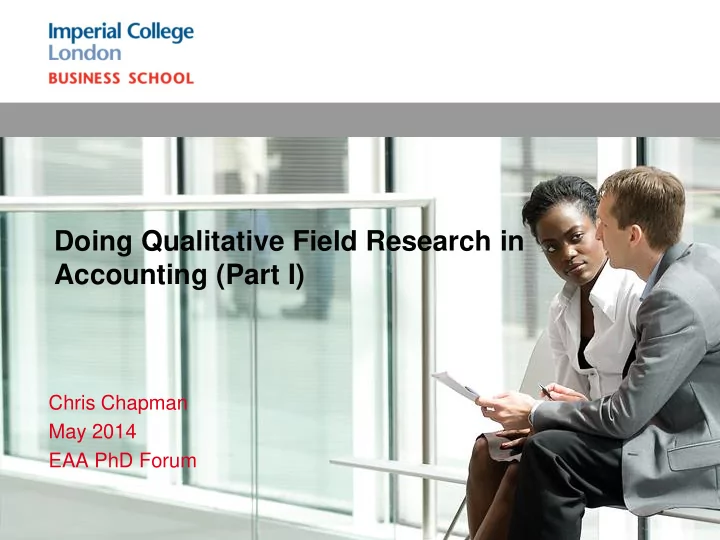

Doing Qualitative Field Research in Accounting (Part I) Chris Chapman May 2014 EAA PhD Forum
What is qualitative field research? Answering this question requires us to understand that the field is a domain of research • Alongside the laboratory or the archive, for example The word “ qualitative ” raise the questions of how is the research undertaken and to what ends? An interview is a method, and yet there are very many different ways in which an interview might be understood as a research method • A tightly structured interview – akin to verbal delivery of a questionnaire • A semi-structured interview – covers a range of possibilities • An unstructured interview – in practice this is difficult to imagine in strong form How is a bigger question than method then, it is one of methodology which drives the appropriate mobilisation of a particular method
. The Challenge of Incommensurability Burrell, G., & Morgan, G. (1979). Sociological paradigms and organizational analysis. Aldershot: Ashgate publishing Change Disintegration Conflict Coercion Radical change Objective Nominalism Radical Realism Radical Humanist Anti-positivism Structuralist Positivism Voluntarism Determinism Interpretive Functionalist Ideographic Nomothetic Regulation Stability Functional Co-ordination Integration Consensus Incommensurability is at least in part a question of choice not try • Remember this when we discuss journal rankings later…
Interesting and Researchable Questions “ Interesting ” and “ Researchable ” as judged by whom? Relevance vs Rigour • Different communities of researchers and publication outlets both define the terms and strike balances between them very differently The problem of understanding accounting is large and so it seems highly unlikely that anyone has the single best solution Read widely and appreciate that variety of qualities on offer • Chapman, C.S. (2012). Framing the Issue of Research Quality in a Context of Research Diversity. Accounting Horizons 26, 821-831 A good question to ask yourself in relation to your own projects is • Who will do what differently as a result of reading my work? In this exercise, theory is an excellent tool for organizing and communicating our thoughts
Theory – Organizing and communicating thought http://en.wikipedia.org/wiki/Theory • In philosophy, theory (from ancient Greek theoria, θεωρία, meaning "a looking at, viewing, beholding") refers to contemplation or speculation, as opposed to action. Theories comprise two fundamental elements • A set of propositions as to the nature of the building blocks of an explanation • Some ideas as to how these building blocks may (may not) fit together Theories are neither interpretive nor positivistic in and of themselves • In practice we see much patterning but this is a matter of custom and practice Emphasises that theory perpetuates itself through communities of researchers who work to develop lines of contribution
Theory and simplification Theories are all partial and incomplete ways of studying and explaining the world Learning the “ practice ” of any one theory is a lot of hard work • Working tool not window dressing vocabulary • Requires extensive reading and continued practice Learning two therefore doubles that… It then also adds the requirement to meaningfully relate the two • Horse racing for positivists • Integration for interpretivists At least three times as much work • High risk – High payoff Better to understand this limitation of theory as its strength since we already have complexity – what helps others is simplicity
Structuring an interpretive research process Suddaby, R. (2006). From the Editors: What Grounded Theory is Not. Academy of Management Journal 49 , 633-642. Theoretical Sampling Constant Comparative No Method Yes Write paper Theoretical Engage audience Saturation?
Discussing the nature of “ Relevance ” Alvesson, M., and J. Sandberg. 2011. Generating Research Questions Through Problematization. Academy of Management Review 36(2) 247-271. • Interesting is something that challenges assumptions » “ Gap spotting ” – under problematises » “ Critical ” – Over problematises? • Problematising is a question of making explicit what assumptions might “ fruitfully be challenged ” Impact on practice? • I have never seen work turned away because it has an impact on practice, but that is neither necessary for all work, nor sufficient for any in the context of an academic journal The impact of academic knowledge (on anything) rarely arises most powerfully through individual articles
Recommend
More recommend